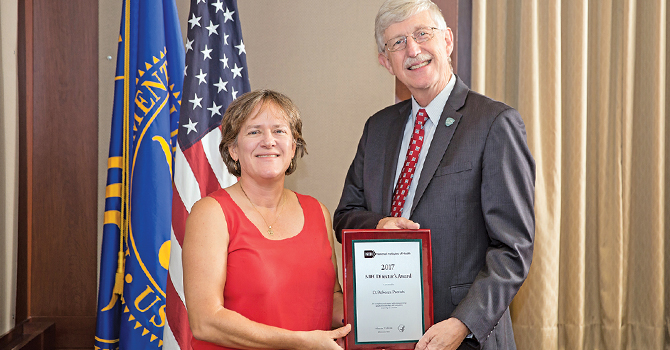Data in Action: Alum Lauded for Success in Mentoring Uses Epidemiology Research to Serve

Rebecca Prevots
MPH ’88, PhD ’91, Epidemiologist, Associate Scientist, and Chief of the Epidemiology Unit, Division of Intramural Research, National Institutes of Health
This summer, D. Rebecca Prevots, MPH '88, PhD '91, was awarded a 2017 National Institutes for Health (NIH) Director's Award—the Ruth L. Kirschstein Mentoring Award—for "exemplary performance while demonstrating significant leadership, skill, and ability in serving as a mentor."
Prevots leads the NIH Epidemiology Unit in the Division of Intramural Research at the National Institute of Allergy and Infectious Diseases (NIAID). Her unit leads and supports population based and clinical research for infectious diseases and conditions of interest to NIAID, including nontuberculous mycobacterial diseases and bronchiectasis, antimicrobial resistance, rare fungal diseases, and malaria. "Training is vital to the mission of NIH and to my unit," says Prevots. "An important part of my job is bringing in and mentoring master's and post-doctoral students who work with me on areas of mutual interest."
Prevots credits her PhD advisor at Michigan Public Health—James Koopman—and other mentors here, like Ruth Little, with inspiration and opportunities in the field of epidemiology. "In my career, I've had great mentors who helped me figure out what I wanted and was good at. I find it very rewarding to support motivated students in their projects and problem solving. And I enjoy working with them on career development—whether they're moving on to graduate school or to a career in applied public health, medicine, or academia."
Prevots believes the academic ethos at NIH is also a big contributor to finding and supporting talented students. "I am fortunate to be in an environment where teaching and mentoring are valued and fostered. Prior to joining NIH in 2013, Prevots was an epidemiologist at the Centers for Disease Control and Prevention (CDC), which she joined as an Epidemic Intelligence Officer after completing her PhD at Michigan.
Prevots began her public health research career at the New York City Department of Health in 1985 through the Health Research Training Program. Working as a public health advisor in the AIDS Surveillance and Epidemiology unit, she saw the devastating impact of AIDS in the community. As she and her colleagues studied the prevalence of HIV in people with active tuberculosis and began redefining our understanding of a new and devastating disease, she realized epidemiology would be her life's work. "It was that year in New York that made all the difference. I decided then to go into a field where I felt I could have an impact," Prevots says.
During the summer between her two years as an MPH student here at Michigan Public Health, this budding disease detective spent four months in Mexico with the Mexican Ministry of Health's Program in Applied Epidemiology. The program was modeled on a CDC program and started by James Koopman in collaboration with the Mexican government. That summer, Prevots investigated outbreaks and honed her data-collection skills in the field. This early collaboration led to a successful international partnership grant from Michigan as part of her studying dengue fever in Mexico for her doctoral dissertation. Later, while at the CDC working with the Global Immunization Division, she spent two years in Brazil assigned to the Pan American Health Organization as a technical advisor for measles elimination.
Since coming to NIAID, Prevots and her group have conducted novel epidemiologic work to define the US burden of lung disease from nontuberculous mycobacteria, a generally noncommunicable mycobacteria ubiquitous in water and soil. Using epidemiologic methods, her group is working to describe the relative contribution of host and environmental factors to disease patterns in the US.
Currently, Prevots and her group are focused on antimicrobial resistance, developing new clinically relevant definitions for drug resistance. In all of it, she is still energized by the new perspectives her mentees bring to the research. "I often feel that the one who learns the most is the teacher," she says, "and I am always learning from my students and staff."
That energy, along with the promise of a deep impact on communities in need, keeps Prevots going. "As an epidemiologist, these traditional tools for collecting, organizing, and interpreting data are our bread and butter—What diseases are out there? Who is getting them? Why are they getting sick? This is how we define disease and figure out how to prevent it," she explains. "Public health is all about data in action, and we want to do research that ultimately has an impact on clinical practice and policy."
This article first appeared in the fall 2017 issue of Findings, the magazine of the University of Michigan School of Public Health.
- Read other alumni profiles on the We Are Michigan Public Health site.
- Learn more about Epidemiology at Michigan Public Health.
- Support mentoring and student scholarships at Michigan Public Health.
